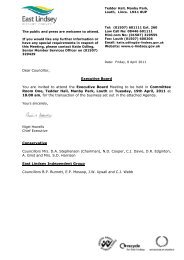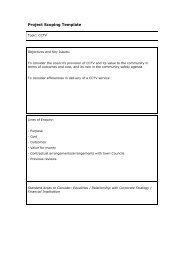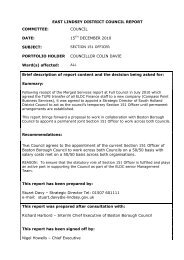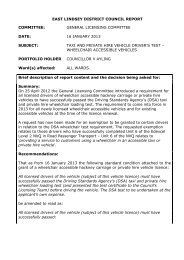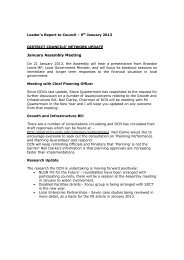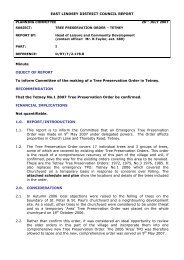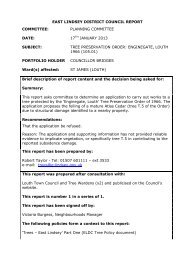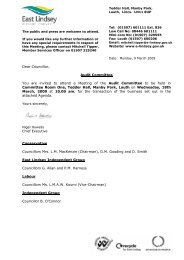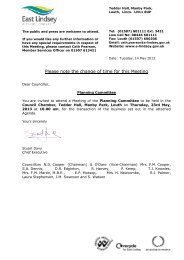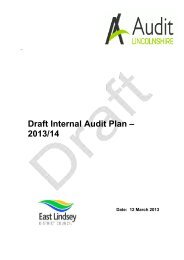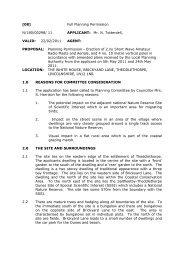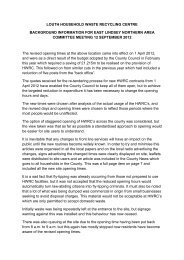challenge 25 policy - East Lindsey District Council
challenge 25 policy - East Lindsey District Council
challenge 25 policy - East Lindsey District Council
You also want an ePaper? Increase the reach of your titles
YUMPU automatically turns print PDFs into web optimized ePapers that Google loves.
EAST LINDSEY DISTRICT COUNCIL REPORT<br />
COMMITTEE:<br />
LICENSING ACT 2003 COMMITTEE<br />
DATE: <strong>25</strong> NOVEMBER 2009<br />
SUBJECT:<br />
PORTFOLIO HOLDER<br />
Ward(s) affected:<br />
CHALLENGE <strong>25</strong> POLICY<br />
COUNCILLOR J WEBB<br />
ALL WARDS<br />
Brief description of report content and the decision being asked for:<br />
Summary:<br />
To consider whether or not to consult on a possible amendment to the Licensing<br />
Policy that would encourage the use within the alcohol licensed trade of a<br />
Challenge <strong>25</strong> Scheme rather than a Challenge 21 Scheme.<br />
Recommendations:<br />
That the Committee decide whether to continue encouraging the use of a<br />
Challenge 21 Scheme within the Licensing Policy or should a review of the<br />
current Licensing Policy be undertaken with a view to moving towards an<br />
encouragement of the Challenge <strong>25</strong> Scheme.<br />
This report has been prepared by:<br />
Mr A Twiddy Tel: 01507 329448 - e-mail: adrian.twiddy@e-lindsey.gov.uk<br />
This report was prepared after consultation with:<br />
Not Applicable<br />
This report is number 1 in a series of 1.<br />
This report has been signed off by: John Green (Business Manager –<br />
Regulatory Services)<br />
The following policies form a context to this report:<br />
The <strong>Council</strong>’s current Licensing Policy published in December 2007 in relation to<br />
the Licensing Act 2003.<br />
This report is a key decision included in the Forward Plan.
LIST OF BACKGROUND PAPERS AS REQUIRED BY LAW<br />
(papers relied on to write the report but which are not published and do not<br />
contain exempt information)<br />
1. Not Applicable<br />
OTHER HELPFUL PAPERS<br />
(papers which the report author considers might be helpful – this might include<br />
published material)<br />
1. DCMS Guidance to Licensing Authorities issued under Section 182 of the<br />
Licensing Act 2003.<br />
Local Government (Access to Information Act) 1985<br />
Is the report Exempt – NO<br />
Please contact the person who has written this report or Mr D<br />
Hollingworth<br />
Tel. No. 01507 601111 Extn 867<br />
e-mail: duncan.hollingworth@e-lindsey.gov.uk, if you want more<br />
information about this report or the background papers.<br />
1.0. INTRODUCTION<br />
1.1. Section 5 of the Licensing Act 2003 requires the <strong>Council</strong> (the Licensing<br />
Authority) to prepare and publish a Licensing Policy that it proposes to<br />
apply in exercising its licensing functions. The statement will last for a<br />
maximum of three years, but can be reviewed and revised by the<br />
Authority at any time. This Authority’s current statement was published<br />
in December 2007 and must be reviewed and adopted by the end of<br />
January 2011.<br />
1.2. Earlier this year the Licensing Act 2003 Committee discussed the issue of<br />
Challenge 21 and Challenge <strong>25</strong> Schemes. Members of the Committee<br />
made reference to the current trend towards Challenge <strong>25</strong> rather than<br />
Challenge 21 within certain areas of the licensed trade. The Committee<br />
expressed a wish to consider the issue and decide whether or not it was<br />
appropriate for the Licensing Authority to be encouraging the use of<br />
Challenge <strong>25</strong> rather than Challenge 21. The Principal Licensing Officer<br />
was asked to present a Report to the Committee with a view to the<br />
Committee perhaps recommending an amendment to the <strong>Council</strong>’s<br />
Licensing Policy in this area.
2.0. BACKGROUND<br />
2.1. The <strong>Council</strong>’s current Licensing Policy encourages the use of a Challenge<br />
21 <strong>policy</strong> (or similar scheme) within the licensed trade. An extract from<br />
the current <strong>policy</strong> detailing the <strong>Council</strong>’s recommendations in relation to<br />
Challenge 21 is attached at Appendix A of this Report.<br />
2.2. Challenge 21 is a scheme in the United Kingdom introduced by the<br />
British Beer and Pub Association (BBPA) aimed at preventing young<br />
people gaining access to age restricted products including cigarettes and<br />
alcohol. Under the scheme, customers attempting to buy age-restricted<br />
products are asked to prove their age if in the retailer's opinion they look<br />
under 21, even though the minimum age to buy alcohol and cigarettes in<br />
the UK is 18.<br />
2.3. The scheme was first launched in 2004/05 and has since been adopted<br />
by large sections of the licensed trade.<br />
2.4. The campaign is not an over 21s only entrance <strong>policy</strong>, but rather a<br />
requirement to ask for ID if a customer appears to be under 21, so as to<br />
prove that he or she is at least 18 years of age. The principle of<br />
Challenge 21 – to support and educate employees and customers on the<br />
issues relating to under age sales – is now firmly embedded within the<br />
licensed trade.<br />
2.5. The usual process followed at this Authority in relation to Licensing Policy<br />
amendments has been for the Licensing Committee to consider the draft<br />
<strong>policy</strong> document before it is issued for consultation. The result of the<br />
consultation is then reported back to the Licensing Committee and any<br />
appropriate amendments are made. The Licensing Committee then<br />
recommends the revised Licensing Policy to the <strong>Council</strong> for adoption.<br />
2.6. Adoption of the Licensing Policy cannot be delegated to the Licensing<br />
Committee. Therefore full <strong>Council</strong> must adopt the final document. This is<br />
different to the granting of premises licences, which the 2003 Act<br />
automatically delegates to the Licensing Committee.<br />
2.7. Any proposed amendments to the Policy must be issued for consultation<br />
before any revision is recommended to <strong>Council</strong> for adoption.<br />
3.0. SUBJECT INFORMATION AND ISSUES/FACTS AND FIGURES<br />
3.1. Over time, the Challenge 21 Scheme has been raising awareness among<br />
publicans and their staff of the need to be vigilant in preventing<br />
underage sales. The scheme serves as a reminder to customers that it is<br />
against the law to purchase alcohol if you are under 18, or to purchase<br />
alcohol on behalf of someone who is under 18. The motto usually used
on promotional material is “If you are lucky enough to appear under 21,<br />
you can expect to be asked to prove your age”.<br />
3.2. Research has demonstrated that nationally a large percentage of 18-24<br />
years olds are aware of the Challenge 21 scheme, demonstrating the<br />
success of the scheme amongst its key target group. Nationally pubs<br />
turn away many customers who, when <strong>challenge</strong>d, are unable to provide<br />
acceptable proof of age.<br />
3.3. The BBPA and its members have now circulated almost half a million<br />
Challenge 21 posters to British pubs. Hard copies of the Challenge 21<br />
poster can be obtained from BBPA website (www.beerandpub.com) and<br />
other associated websites. <strong>East</strong> <strong>Lindsey</strong> <strong>District</strong> <strong>Council</strong> also has its own<br />
Challenge 21 poster and guidance literature, which is issued to licensed<br />
premises – copies of the <strong>East</strong> <strong>Lindsey</strong> literature is attached at Appendix<br />
B of this Report.<br />
3.4. This Authority promotes and educates licensees in relation to Challenge<br />
21 by:<br />
• Providing information and posters to all liquor licence applicants<br />
• Encouraging use of posters, etc, through the Enforcement Officers<br />
• The Licensing Committee, when appropriate, requiring Challenge 21<br />
to be a condition of a premises licence.<br />
3.5. According to government figures the Challenge 21 Scheme has been<br />
successful in reducing the number of under-18s gaining access to<br />
alcohol. Fewer pubs and off-licences are persistently selling alcohol to<br />
children thanks to strict penalties, tough enforcement and also efforts<br />
nationally by the industry. It is clear that the Challenge 21 <strong>policy</strong> has<br />
become established as standard practice across responsible areas of the<br />
industry. However the underlying figures indicate there is still room for<br />
further improvements to stop underage sales.<br />
3.6. In May 2007, it was reported that Asda stores in Scotland were operating<br />
a Challenge <strong>25</strong> scheme, whereby anyone who appeared to be below the<br />
age of <strong>25</strong>, seven years above the age required to buy alcohol in the UK,<br />
would be asked to provide a form of ID such as a passport or a driving<br />
licence.<br />
3.7. Challenge <strong>25</strong> has now been rolled out across the UK to other national<br />
supermarkets (Tesco Morrisons, Sainsburys, etc.), following in the<br />
footsteps of Asda who introduced Challenge <strong>25</strong> in an attempt to stamp<br />
out underage sales.<br />
3.8. It is fair to say that nationally Challenge <strong>25</strong> is a <strong>policy</strong> championed by<br />
the off-trade and supermarkets rather than the on-licensed trade. The<br />
BBPA has indicated that in its opinion Challenge 21 remains the best<br />
<strong>policy</strong> for the on-trade. The BBPA go on to say that pubs and
supermarkets are very different trading environments and as such, a<br />
scheme that is right for one is not always right for the other.<br />
3.9 The rationale behind the supermarkets’ decision to increase the age of<br />
<strong>challenge</strong> to <strong>25</strong> is that a number of young people can make themselves<br />
look 21 years old relatively easily, but it is a lot more difficult for them to<br />
look <strong>25</strong> years old. The aim therefore is that by raising the age of<br />
<strong>challenge</strong> to <strong>25</strong> years, more young people who try and purchase alcohol<br />
whilst under the legal age of 18 years old will be identified and refused.<br />
3.10. The Licensing Team has undertaken informal consultation with Trading<br />
Standards, Lincolnshire Police and other interested parties on the subject<br />
of Challenge <strong>25</strong>. The responses are detailed below.<br />
3.11. Lincolnshire Trading Standards: Lincolnshire Trading Standards<br />
Service is now promoting the newly launched Challenge <strong>25</strong> initiative.<br />
However we feel the most important thing is that licensees have a<br />
suitable proof of age <strong>policy</strong> in place whether it be 21 or <strong>25</strong> and are using<br />
it appropriately. The Trading Standards Institute are also promoting<br />
Challenge <strong>25</strong> rather than Challenge 21 and have asked Trading<br />
Standards Services across the Country to promote the scheme to show<br />
continuity of advice and information provided to businesses. Any<br />
information sent out (i.e. general mail shots) or requested from our<br />
Business Support Team regarding proof of age is now Challenge <strong>25</strong>.<br />
3.12. Lincolnshire Police (The following comments were made by the Police<br />
Licensing Officer for the <strong>East</strong> Division): There have been Home Office<br />
speakers at the last two licensing seminars I've been to, who state that<br />
the current Home Office <strong>policy</strong> is to promote and support the <strong>challenge</strong><br />
<strong>25</strong> scheme. The reason for this is that studies clearly show that younger<br />
members of staff find it increasingly difficult to determine their peers<br />
ages and frequently fall foul of Police and Trading Standards legislation,<br />
subsequently selling alcohol to under age children. Home Office figures<br />
have shown that by implementing a Challenge <strong>25</strong> scheme fewer sales<br />
have been made to minors. This can only be a good thing.<br />
The NHS also fully support the scheme as they provided figures showing<br />
a decrease in Accident and Emergency drink related submissions<br />
involving children when the Challenge <strong>25</strong> scheme was implemented in<br />
Manchester and other areas across the Country.<br />
The Police will support any scheme that reduces underage drinking and<br />
drink related crime and violence offences. Again the statistics show a<br />
decrease in this in areas where Challenge <strong>25</strong> is implemented.<br />
All the figures and studies I have referred to can be found on the Home<br />
Office web site. Attached is a link which shows that a substantial number<br />
of outlets now already implement Challenge <strong>25</strong>. A number in ELDC have<br />
voluntarily adopted the Challenge <strong>25</strong> to override Challenge 21.
I hope my view will help in the decision in implementing Challenge <strong>25</strong>.<br />
N.B. The extract from the Talking Retail website (www.talkingretail.com)<br />
referred to by the Police Licensing Officer is at Appendix C of this<br />
Report.<br />
3.13 Kurnia Intertade Limited: As you are aware our company operate<br />
seven licensed premises within Lincolnshire and also have a consultancy<br />
and training company specialising in all areas of the licensed trade under<br />
the Licensing Act 2003 and Gambling Act 2005.<br />
We feel that the use of Challenge 21 should be promoted with Challenge<br />
<strong>25</strong> being left to the discretion of the premises. Our company fully<br />
supports and promotes Challenge 21. We would however not support or<br />
recommend Challenge <strong>25</strong> unless we felt it necessary for a particular<br />
premises.<br />
We do not know of any evidence why Challenge 21 is not effective and<br />
therefore, if there is no evidence of it being not being effective then, why<br />
increase the age to <strong>25</strong>? The issue that should however be addressed is<br />
that of premises that do not conduct a <strong>challenge</strong> scheme whatsoever as<br />
mentioned in previous correspondence. We feel that premises that are<br />
not operating any type of <strong>challenge</strong> <strong>policy</strong> are the ones where underage<br />
sales are taking place. There is little point in encouraging a scheme of<br />
any age if a premises simply chooses not to operate it.<br />
As you aware it is not illegal for a premises to sell alcohol to a person<br />
who is aged 18 or over. The use of a <strong>challenge</strong> scheme therefore is at<br />
the discretion of the individual who serves the alcohol. We assume that<br />
your Committee may be considering the recommending of using either<br />
Challenge 21 or Challenge <strong>25</strong>. To try and impose the use of either<br />
scheme as a condition at Review could lead to a <strong>challenge</strong> at Appeal.<br />
The Home Office in their draft Code of Practice for Alcohol Retailers only<br />
suggest a Challenge 21 scheme as a discretionary condition for problem<br />
premises. It is therefore questionable that if the Home Office have<br />
considered that Challenge 21 is sufficient for problem premises then why<br />
would an Authority be considering Challenge <strong>25</strong>?<br />
BBPA stated in their response to the Home Office consultation:<br />
‘We believe that the local discretionary condition which could require a<br />
premise to operate a Challenge 21 scheme is potentially problematic with<br />
regard to age discrimination.<br />
The condition would require the premises to ask to see proof of age<br />
where it is perceived by the person making the sale that the purchaser is<br />
under 21 years of age.
The law is only breached if a sale is made to someone under the age of<br />
18, not if someone looked over 18 but was under 21. However, this<br />
condition could make this an offence in the event of disputes between<br />
premises and Enforcement Authorities on how old someone looks. Such a<br />
judgement is, obviously, subjective.<br />
Due to the rigorous way in which our members are tackling under-age<br />
sales, the attachment of this condition to licences could encourage many<br />
operators to operate age policies such as “Over 21s only” in order to<br />
comply, which could be deemed discriminatory.<br />
We urge the Government to reconsider the inclusion of Challenge 21 or<br />
Challenge <strong>25</strong> as a possible discretionary local condition, and allow the<br />
industry to continue to operate high standards of good practice in this<br />
area while those intent on breaking the law are made subject to the<br />
maximum penalties available under existing legislation by the<br />
enforcement authorities’<br />
British Institute of Inn Keeping (BII) stated in their response to the<br />
consultation;<br />
‘BII members are in support of the Challenge 21 scheme which is well<br />
established in the on trade. In this instance we concur with the views of<br />
BBPA in their response to this condition.’<br />
We have asked BBPA, BII and ALMR, of which we are members of, for<br />
their views. Once we have their comments we shall forward them on to<br />
you.<br />
To conclude our company wishes to request that the Committee retains<br />
the ‘encouragement’ of Challenge 21 as the evidence suggests that<br />
Challenge 21 is effective and workable.<br />
3.14. BBPA: I would just emphasise that we (BBPA) are totally committed to<br />
Challenge 21. As you know we have given away thousands of posters to<br />
premises all over the country and research has shown that Challenge 21<br />
has been widely accepted by the industry and is recognised by<br />
youngsters. Even the Home Office refers to Challenge 21 rather than<br />
other schemes although as it has been pointed out at the consultations<br />
we wouldn't want it to be a mandatory condition as the offence relates to<br />
serving under 18s.<br />
As you rightly point out there is nothing to stop individual outlets<br />
adopting Challenge <strong>25</strong> or as …… might say, Challenge 37 and a half, but<br />
the more age levels you have the more crazy the whole thing is so we<br />
would encourage the continued use of Challenge 21.
3.15. BII: A copy of a letter from the BII regarding their position on Challenge<br />
21/<strong>25</strong>, which confirms that the BII support Challenge 21 as to Challenge<br />
<strong>25</strong>, is attached at Appendix D of this Report.<br />
3.16 Mr P Cordingley, Chattertons, Solicitors: Personally I would welcome<br />
Challenge <strong>25</strong> and have recommended it to clients because it provides<br />
protection for licensees/DPSs and their employees from the<br />
consequences of making mistakes in assessing the age of customers.<br />
That I know will not be the angle, which will concern the Committee but<br />
it is the best way of selling the <strong>policy</strong> to the trade.<br />
4.0. SUPPLEMENTARY FACTS<br />
4.1. The document issued jointly by the DCMS and Home Office “Problem<br />
Premises on Probation – Red and Yellow Card: How it Would Work”,<br />
which included examples of possible tough conditions on premises<br />
licences did not make reference to Challenge 21 or <strong>25</strong> Schemes. The<br />
Licensing Committee considered the document on 7 January 2009.<br />
4.2. The <strong>Council</strong>’s current <strong>policy</strong> will need to be reviewed in due course in<br />
order to address minor variations and alcohol sales in community<br />
venues. Members may wish to bring forward the required 3-year review,<br />
in order to address these issues, rather than waiting until the later half of<br />
2010.<br />
5.0.<br />
COUNCILLOR COMMENTS – If no comments are received from<br />
one or more of the Ward Members consulted state which<br />
<strong>Council</strong>lor(s) did not respond<br />
5.1. Not Applicable<br />
6.0.<br />
DISCUSSION / CONSIDERATION – ISSUES / CONCLUSION –<br />
including reasons for recommendation(s)<br />
6.1. Nationwide the promotion of Challenge <strong>25</strong> is currently undertaken more<br />
often than not by off licences and supermarkets. There is little<br />
encouragement from the pub trade organisations (BII and BBPA) for the<br />
introduction of Challenge <strong>25</strong> rather than Challenge 21. By way of<br />
contrast the Police and Trading Standards would welcome an increase to<br />
Challenge <strong>25</strong>.<br />
7.0. PERFORMANCE MONITORING<br />
Subject Deadline Responsible Officer<br />
Not applicable Not applicable Not applicable
8.0. RISK ASSESSMENT<br />
8.1. There is a theoretical risk of civil action against the Licensing Authority if<br />
it is found not to have exercised due diligence in licensing matters. There<br />
is also the risk of judicial review if the Policy is found not to comply with<br />
the requirements of the Licensing Act 2003 and associated legislation,<br />
regulations and guidance.<br />
9.0. FINANCIAL CONSIDERATIONS/IMPLICATIONS<br />
9.1. Any <strong>policy</strong> review would being undertaken as part of normal duties<br />
carried out by the Licensing Team with no additional costs involved.<br />
10.0. LEGAL CONSIDERATIONS/IMPLICATIONS<br />
10.1. In the majority of cases the adoption of the Challenge 21 Scheme or<br />
Challenge <strong>25</strong> Scheme by individual premises will be voluntary.<br />
10.2. Under the Licensing Act 2003, a premises licence holder may choose to<br />
adopt a Challenge 21 or Challenge <strong>25</strong> Scheme in their Operating<br />
Schedule, which will then become part of their premises licence<br />
conditions.<br />
10.3. In the interest of achieving one or more of the four licensing objectives<br />
and following information considered at a licensing hearing, the Licensing<br />
Authority can attach the adoption of a Challenge 21 Scheme or Challenge<br />
<strong>25</strong> Scheme to the conditions of an individual premises licence.<br />
11.0.<br />
INCLUDE IF APPROPRIATE AND ONLY BRIEF EXPLANATION OF<br />
ISSUE<br />
11.1. Environmental issues – None directly arising.<br />
11.2. Human Resources – None directly arising.<br />
11.3. Section 17 – All Local Authorities must fulfil their obligations under<br />
Section 17 of the Crime and Disorder Act 1981 when carrying out their<br />
functions as Licensing Authorities. Section 17 places a duty on Local<br />
Authorities to do all they reasonably can to prevent crime and disorder in<br />
their area.<br />
11.4. FOI/Human Rights/Data Protection - Human Rights: The Licensing<br />
Authority must ensure that its decisions and policies can withstand<br />
scrutiny by reference to the principle of proportionality, i.e. is the<br />
decision / action proportionate to what it wishes to achieve, or,<br />
colloquially does the end justify the means.
11.5. Equality and Diversity – None directly arising.<br />
12.0. RECOMMENDATIONS<br />
12.1. That the Committee decide whether to continue encouraging the use of a<br />
Challenge 21 Scheme within the Licensing Policy or should a review of<br />
the current Licensing Policy be undertaken with a view to moving<br />
towards an encouragement of the Challenge <strong>25</strong> Scheme.<br />
13.0.<br />
HOW DO THE ACTIONS/RECOMMENDATIONS CONTAINED IN<br />
THIS REPORT DELIVER OUR COMMUNITY AND CORPORATE<br />
STRATEGIES?<br />
13.1. The licensing and compliance role of the <strong>Council</strong> is important in<br />
improving the health, safety, security and welfare of the <strong>District</strong>'s<br />
residents, visitors and business community.<br />
Appendix A – An extract from the licensing current <strong>policy</strong> detailing the<br />
<strong>Council</strong>’s recommendations in relation to Challenge 21.<br />
Appendix B - Examples of <strong>East</strong> <strong>Lindsey</strong> literature in relation to Challenge 21.<br />
Appendix C – Extract from the Talking Retail website referred to by<br />
Lincolnshire Police.<br />
Appendix D – Letter from BII on the subject of Challenge <strong>25</strong>.




![[12] Full Planning Permission N/113/01975/ 10 APPLICANT ...](https://img.yumpu.com/50923921/1/184x260/12-full-planning-permission-n-113-01975-10-applicant-.jpg?quality=85)
